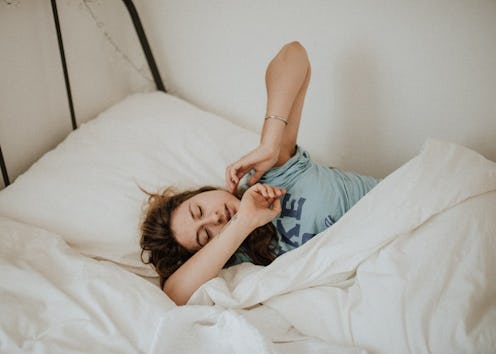As anyone with insomnia or other sleep issues can tell you, getting poor or non-existent shuteye is never fun — but it turns out that the issue can be even worse if you have insomnia identity. What is insomnia identity, you ask? In short, it’s the belief that you have insomnia, even if your actual sleep quality is fine — and according to a new paper authored by Kenneth Lichstein at the University of Alabama and published in the journal Behaviour Research and Therapy, it can have an even worse affect on your health than plain old sleeplessness.
Lichstein has been studying insomnia identity for some time; in a previous study, for example, he looked at how insomnia identity — which he defines in his current study as as “the conviction that one has insomnia, and this sleep complaint can be measured independently of sleep” — relates to the Big Five personality traits. In the older study, Lichstein found that folks with insomnia identity scored more highly in Neuroticism, but lower on Trait Emotional Intelligence (TEI). “Those who believe they have insomnia may have more neurotic tendencies and perceive their own emotional abilities as less favorable than those who do not endorse this sleep pathology,” the study concluded.
The current paper, meanwhile, is a literature review, meaning it examines and assesses existing research in order to address ap articular question. In this case, it looks at how well people sleep versus how well they say or think they sleep — and the results revealed that about a quarter of the population are “uncoupled sleepers,” which means that the actual quality of their sleep doesn’t match up with how they appraise it themselves.
Cody Delistraty at The Cut’s Science of Us points to a 1995 study included in Lichstein’s review as an example of this phenomenon in action: In that study, which examined participants who were 55 years of age or older, it was discovered that most the folks who were actually poor sleepers didn’t actually think that they had insomnia. Meanwhile, Lichstein’s review also found that about 37 percent of people who say they have insomnia actually sleep just fine, for the most part.
The kicker is this: The folks in that 1995 study who slept poorly, but didn’t think of themselves as having insomnia? They didn’t feel anymore fatigued or anxious after a night of poor sleep than people who got sleep of a much higher quality than they did. Furthermore, the 37 percent of people Lichstein identified as having insomnia identity without actually having insomnia suffered the same ill effects that people who actually did suffer from “a clinical deficit of sleep.” According to the massive body of research on how poor sleep affects your health, not getting enough rest can impair your memory, mess with your immune system, increase your risk of cardiovascular disease and stroke, up your anxiety, and much, much more.
Remember Lichstein’s definition of insomnia identity? “The conviction that one has insomnia, and this sleep complaint can be measured independently of sleep?” Both parts of that definition are important; they’re what sets it apart from straight-up insomnia, which is characterized by trouble falling or staying asleep and is considered chronic if experienced for longer than a month. (The American Psychological Association also notes that chronic insomnia can come and go; even if you have it, you might actually sleep quite well for a couple of days, but then sleep poorly for a number of days afterwards.)
This isn’t to say that insomnia isn't a real problem, or that good-quality sleep isn’t necessary to our continued healthy functioning; insomnia is real, and adequate sleep is essential to our health. Nor is it meant to minimize the struggles of those who do suffer from poor sleep and impaired function as a result of it — as someone who does often sleep badly (and sometimes not at all), I can definitely attest to those struggles myself.
It does, however, underline the importance of getting treatment for sleep issues if you think you might benefit from it. Indeed, Lichstein’s study notes that those who claim or endorse an insomnia identity are also at a greater risk of suffering from things like depression, anxiety, hypertension, fatigue, and even suicidal ideation; as such, treatment could make all the difference in helping to mitigate not just the impact of poor sleep, also of insomnia identity.
Not sure where to start? Your GP will likely be able to recommend a sleep specialist to you if you think you need one; from there, you might think about doing a sleep study to nail down exactly what your problems might be and what might be causing them. In the meantime, though, you can always try a few sleep hacks. It’s worth a shot, right?
